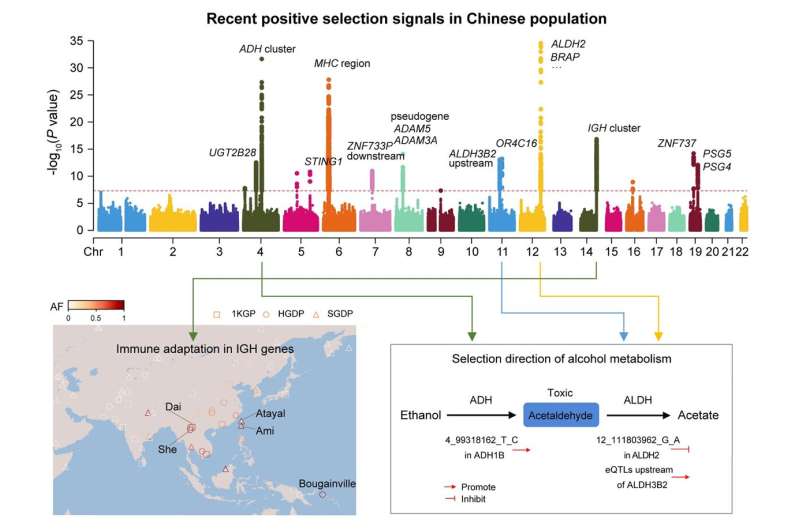This article has been reviewed according to Science X's editorial process and policies. Editors have highlighted the following attributes while ensuring the content's credibility:
fact-checked
trusted source
proofread
Examining immunoglobulin heavy chain genes and alcohol metabolism-related genes in the Han Chinese population

Understanding the traits that have undergone positive selection during human evolution can provide insight into the events that have shaped our species, as well as into the diseases that continue to plague us today. As the most populated ethnic group, the Han Chinese have been undergoing genetic selection in their specific historical, geographical and cultural environment.
This study investigated the selection footprints of genomic sequences in Han Chinese, and then attempted to elucidate phenotypic evolution associated with genomic signatures for both monogenic traits and polygenic traits. In total, 24 genetic loci were identified under recent selection by analyzing 3946 high-depth WGS data.
Among the signals, interestingly and surprisingly, the risk allele (rs117518546-T) of systemic lupus erythematosus (SLE) in the immunoglobulin heavy chain locus was the favored selection allele. The allele frequency of rs117518546-T was almost fixed in southern China and some islands in Oceania, and gradually decreased in northern East Asia with increasing distance from southern China.
Though the favored allele increases the risk of autoimmune disease SLE in present day, the enhanced immune response by the allele may improve survival in certain extreme environments in southern China in history. The risk of SLE is the side effect of selection for survival, similar to the famous example that the sickle cell mutation in the Hemoglobin-B gene (HBB) was also the target of selection for malaria resistance in Africa.
In addition to well-known ADH1B and ALDH2, this study identified a third novel alcohol metabolism-related gene ALDH3B2 under selection. The selected allele in the ALDH3B2 region had the opposite effect on alcohol metabolism as that in ALDH2. This may be due to the variants and selections occurring at different times in history, which reflected the complexity of evolution. We also identified a novel olfactory perception gene OR4C16 under selection through a stop-gain variant.
Besides monogenic traits, multiple complex traits experienced polygenic adaptation. Particularly, this study indicated that lower blood pressure was favored in natural selection. It was speculated that blood pressure was increased by the environments, lifestyle, and dietary habits in the past millennium. At the genetic level, it evolved towards reducing the blood pressure to balance and prevent the blood pressure from rising beyond the body's tolerance.
Finally, a database named RePoS (Recent Positive Selection, http://bigdata.ibp.ac.cn/RePoS/) was built to integrate and display multi-population selection signals.
The findings are published in the journal Science Bulletin.
More information: Huaxia Luo et al, Recent positive selection signatures reveal phenotypic evolution in the Han Chinese population, Science Bulletin (2023). DOI: 10.1016/j.scib.2023.08.027
Provided by Science China Press





















